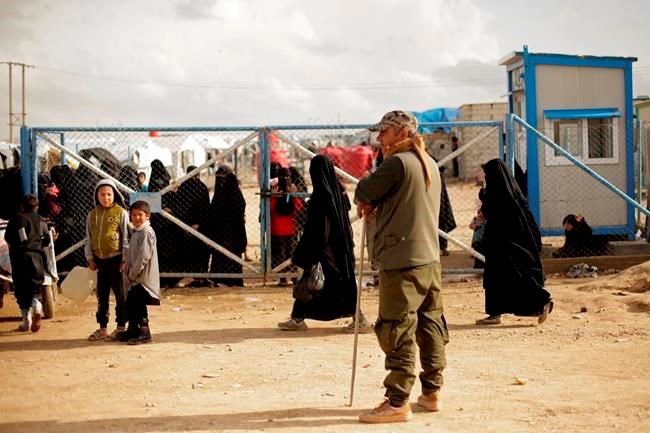A lawyer for two Canadian women and three teen girls who were to be repatriated from northeastern Syria earlier this month says they were mistreated by guards and are being detained in a camp primarily holding family members of individuals with alleged links to the Islamic State of Iraq and the Levant.
Edmonton lawyer Zachary Al-Khatib said one of the women was able to make a brief phone call to a family member in Canada early Tuesday before the call was cut off. He said the woman indicated they were alive and had been moved to the Roj camp but had been mistreated, needed medical attention and had all their possessions taken.
"It was very concerning for the family obviously to hear this after 11 days of nothing," he said.
Under an agreement with Global Affairs Canada, the group of five was to be transported from the Al-Hol camp, where they had been detained, to the Roj camp to join four other women and 10 children.The others returned to Canada on April 6.
Al-Khatib said while those still in Syria were concerned about their safety with the transfer between camps, the Canadian government told them they had communicated with Kurdish forces running the Al-Hol camp.
"They were given assurances that they would be safe," he said. "Then when they presented themselves to be transported, they went missing for 11 days and the government had no answers."
Al-Khatib said Canada needs to take immediate steps to ensure the women and girls are safe and repatriated.
"The government has been silent on this," he said.
"The government has to provide answers to the family and to the public."
Al-Khatib said he does not know why the women still at the Roj camp, ages 41 and 33, originally travelled to Syria, but he has not been shown any evidence of criminal intent or that they broke the law.
Global Affairs Canada said in a statement it has "credible information" that the women are in the Roj camp but declined to comment further citing privacy and operational security.
"Canada has taken extraordinary steps to repatriate Canadian women and children identified in the Bring Our Loved Ones Home litigation. As long as conditions allow, we will continue this work," the statement reads.
Letta Tayler, associate director in the crisis and conflict division of Human Rights Watch, agreed it is critical that the Canadian government find out what happened and explain it to the family and public.
"This incident involving the five who were left behind is emblematic of the problems inherent in this unlawful detention system, this process of Canada and other countries outsourcing responsibility to their nationals to a non-state actor in a war zone," she said. "Things are not necessarily going to go smoothly in these circumstances."
Tayler said many other women have alleged that they were detained within Al-Hol or at other sites, and in some cases were abused while being transferred from Al-Hol to the Roj camp. She said some women have claimed they were taken to a holding cell they called the "Red Prison," which she said sounds like a detention area in Al-Hol.
"Some of the testimonies I've heard are that women and children are held in rooms that are basically latrines," she said. "These are horrific conditions."
Human Rights Watch said in December that since ISIS's territorial defeat in 2019, more than 42,400 foreigners accused of links to ISIS have been held in camps and prisons in northeastern Syria, most of them children, who haven't been brought before a judicial authority to determine the need or legality of their detention. In 2020, it said that included at least 47 Canadians.
The international non-governmental organization said medical care, clean water, shelter and education in the camps are "grossly inadequate" and called on countries with detainees to repatriate their citizens.
Ottawa-based lawyer Lawrence Greenspon reached the agreement in January to repatriate 19 Canadian women and children who had been part of a lawsuit against the federal government known as BOLOH, or “Bring Our Loved Ones Home.” The federal government is appealing a court order to repatriate four men being detained in Syria.
Three of the four women who returned to Canada this month were arrested upon arrival under a Terrorism Peace Bond Application and have since been released on bail.
Two other women who were repatriated from Syria with two children in October were also arrested upon arrival, one of whom is facing criminal charges.
"We have both the laws and the personnel and there's a whole department, the Department of Justice, that's set up to deal with these kinds of prosecutions," Greenspon said. "There's absolutely no reason not to bring these Canadians home and deal with them appropriately under the Canadian criminal justice system as opposed to letting them rot in the prisons and detention camps."
This report by The Canadian Press was first published April 18, 2023.
___
This story was produced with the financial assistance of the Meta and Canadian Press News Fellowship.
Emily Blake, The Canadian Press




